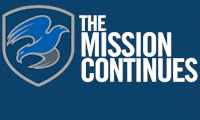SERVICE LEADERSHIP CORPS TRAINING
As a member of the Service Leadership Corps, you’ll have the chance to keep learning and growing throughout the year. These training sessions will be led by professionals, Mission Continues staff, or former members who can share their knowledge and experiences. You’ll get to improve your abilities in areas like finding and involving volunteers, building partnerships with community organizations, planning projects, taking care of yourself, and more. Each training will also be a great opportunity to connect with others and develop new skills.
Learn more about new training opportunities below!
NEW TRAINING OPPORTUNITIES
Veteran MILE Leadership Development Training
- Hosted By: Give an Hour
- Event Type: Leadership Development / Wellness Training
- Duration: 90 minutes
- Audience: Platoon Leadership Team Members (Veterans Only)
- Capacity: 40 participants per session (first come, first served)
Join Give an Hour for this 90-minute, evidence-informed introduction to resilience-building in professional settings, a program designed for veteran workers and leaders. This interactive session covers foundational mental health and resilience skills, practical peer support strategies, and tools for fostering veteran-positive culture and success in mission-driven organizations. Participants will explore leadership development, meaningful connection, and simple, sustainable practices to build stronger relationships, manage stress, and foster a supportive, connected community for themselves and those around them. We can’t wait to launch this learning journey alongside you!
Please only register for one event, spaces are limited to 40 participants each!
Thursday, June 5th | 12:00 PM – 1:30 PM CDT
Saturday, June 7th | 1:00 PM – 2:30 PM CDT
MISSION READY FAQ
SERVICE LEADERSHIP CORPS CREDLY BADGE

Who can earn this badge: Platoon Leaders (PL) and Platoon Leadership Team Members (PLT)

Who can earn this badge: Platoon Leaders (PL)

Who can earn this badge: Platoon Leaders (PL) and Platoon Leadership Team Members (PLT)
Please watch for an email from Credly with your completion badge information after accepting your badge. Contact Kathy Mackie, kmackie@missioncontinues.org, if you have any questions or check out the FAQ page for more information.
Share your Credly badge on social media – Twitter, Facebook, Instagram, LinkedIn, etc!
Get Involved in Other Ways
Volunteer at a Service Project
Service Platoons are your opportunity to engage and connect with veterans and community members while generating community impact in a real and tangible way.
Follow Us on Social
Follow us on Facebook, as well as on Instagram, LinkedIn, Twitter, and YouTube to stay connected with the TMC community!
Veteran Online Leadership Training
If you’re looking to learn new leadership skills, or brush up on existing ones, VOLT has you covered. Our veteran-focused courses are designed to teach participants how to lead in their communities and engage in asset-based personal development practices.
 You are successfully logged in.
You are successfully logged in.





